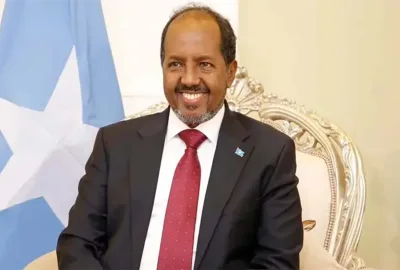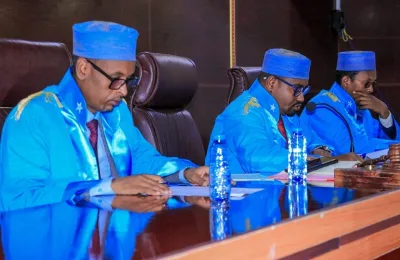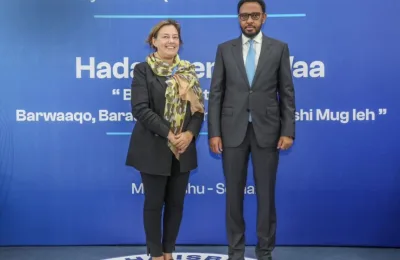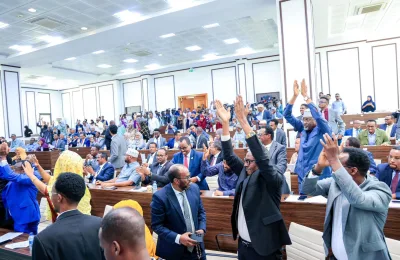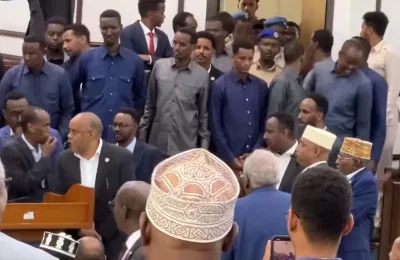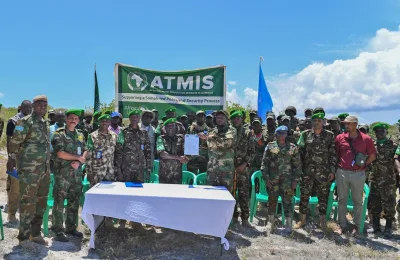Despair, frustration and palpable outrage hanged over Somalia last week, after AMISOM peacekeepers killed a Somali…
 Despair, frustration and palpable outrage hanged over Somalia last week, after AMISOM peacekeepers killed a Somali family in the port town of Merka, which is some 70km (45 miles) south of the capital, Mogadishu following an alleged al-Shabaab attack on their convoy on the 31st July. It was the second time the African Union forces had killed civilians in less than a month in the same city.
Despair, frustration and palpable outrage hanged over Somalia last week, after AMISOM peacekeepers killed a Somali family in the port town of Merka, which is some 70km (45 miles) south of the capital, Mogadishu following an alleged al-Shabaab attack on their convoy on the 31st July. It was the second time the African Union forces had killed civilians in less than a month in the same city.
This incident failed to catch the attention of international media who were much focused on the landmark visit of U.S. President Barack Obama to the Horn of Africa.
One of the victims’ relative recalled the events of that evening in an interview with a local radio station.
“That night, we had a wedding party in our house. We were around 20 people and the mood was joyful and I was so pleased. We were so happy. All over a sudden, several AMISOM soldiers came inside our house and started to shoot indiscriminately. Four of my cousins and two of my uncles died on the spot and we still don’t know up to now why they were killed.’’
“The mood in our house was one of shock. And we’re still fearful: when will they come and slaughter us again? The wedding party was turned into a funeral,’’ said the relative who decided to
Officials in Merka have confirmed to the media that those killed were all civilians and didn’t have any links or affiliations with the al-Qaeda-linked militants. In total, AMISOM forces have killed more than 25 residents, according to the officials and local elders of Marka.
AMISOM first denied on its twitter account that it had killed civilians, saying that its forces had clashed with insurgents that tried to escape by boat. Days after, it released a statement saying: ‘’In the past two weeks, AMISOM has intensified operations in Lower Shabelle as part of the general offensive being conducted across South Central Somalia. During the same period, our troops’ supply convoys have come under recurrent attacks by Al Shabaab. During these, in self defence, troops have proportionately responded to such attacks. Nevertheless AMISOM regards any loss of innocent lives as tragic and we take all reports of such incidents seriously.’’
Fascinatingly, AMISOM mentioned in its statement that its ‘’troops have proportionately responded to such attacks’’. But how do the International conventions state the principle of Proportionality in an attack:
Rule 14. Launching an attack which may be expected to cause incidental loss of civilian life, injury to civilians, damage to civilian objects, or a combination thereof, which would be excessive in relation to the concrete and direct military advantage anticipated, is prohibited.
However, the most important principle of International human rights law is the prohibition on attacking civilians and civilian objects. The question is that innocent civilians who have nothing to do with the rebels or the offensive against the militants why should they be targets? Or they are unworthy to the African Union peacekeepers?
AMISOM first began its mission in Somalia in 2007, when the African Union Peace and Security Council sent a peacekeeping force consisting of troops from Uganda, Burundi, Kenya, Ethiopia, Nigeria, Ghana, Djibouti, and Sierra Leone. Its presence has grown tremendously over the past seven years as its role has shifted from helping push back against a group known as the Islamic Courts Union, which controlled parts of the country, to countering the threat from al-Shabaab.
The AMISOM is mandated to support governmental structures, implement a national security plan, support the Somali Security Forces, and assist in creating a secure environment for the delivery of humanitarian aid.
Lack of accountability
Somalia’s Federal government, who has the overall responsibility to protect its civilians, remains silent on the acts of the African Union troops in Merka. Though a fact-finding committee was formed in the weekly cabinet meeting held in Mogadishu days ago, the government has not conducted any investigations nor explained to the public about the incident.
Somalis across the globe have asked the function of the government once if it has failed to protect the legal rights of its own citizens.
Former Somalia’s defense minister Abdihakim Mohamoud Fiqi criticized AMISOM for its cruel behaviour against the civilians, calling for the government to bring the ones responsible to the justice.
‘’AMISOM were deployed to fight against the al-Shabaab terrorists, not to kill the civilians. The government should bring justice to the soldiers responsible for this and not be silent from this kind of acts committed by AMISOM which have kept on happening,’’ he said.
Clearly, without a transparent inquiry, the truth cannot be known. But, will the Somalia government be willing to fully investigate these deaths and hold those responsible to account? Despite the promises of AMISOM, early signs are not positive.
The UN Assistance Mission in Somalia, or UNSOM, for example, has a strong human rights mandate to monitor, investigate, and prevent “violations of international humanitarian law committed in Somalia, including through the deployment of human rights observers.”
Giving AMISOM a pass on civilian deaths?
With acts of terrorism and violence such as the recent bombings in Saudi Arabia, Somalia’s Federal government officials are always quick to condemn them publicly.
However, many Somalis have also raised questions on the Federal government’s unexplained silence on AMISOM’s continued abuses towards the civilians. Some have interpreted as an indication that the government doesn’t bother about the civilian casualties.
Merka residents are same and have equal rights & protection similar as the other Somalis or cities. With the town affected by the over two decades of civil war and harsh extremists, they deserve to live in a better and joyful life.
In Mogadishu, AMISOM vehicles have been involved in fatal hit-and-run accidents, leaving many families traumatised after losing their lovely ones cruelly.
AMISOM soldiers are legally prohibited from committing sexually exploitative or abuse acts, according to the African Union Commission Code of Conduct.
Multiple women and girls were sexually abused and exploited by United Nations-backed troops with the African Union Mission in Somalia (AMISOM), according to a new Human Rights Watch report issued last year.
HRW found 21 cases of “sexual exploitation and abuse” by AMISOM soldiers between 2013 and 2014 alone, including instances of gang rape. Most acts of sexual violence occurred when women and girls sought out “medicine or humanitarian services” at an AMISOM base in Mogadishu staffed by soldiers from Burundi. In many instances, soldiers offered food or money to make sexual encounters appear transactional, and all of the attacks happened when Somali intermediaries, acting as interpreters, brought girls to base camps or camp hospitals for soldiers stationed there.
Such incidents do damage the standing of the peacekeeping force, where it is relatively popular, in particular in Mogadishu and other urban areas that it has helped seize back from the militants linked to al Qaeda. AMISOM should focus on winning the hearts and minds of the residents rather than creating hatred among them, which on some occasions will give a moral boost to the insurgents.
The Somali government should take this responsibility seriously. A thorough investigation should be conducted as to which troops have been involved in this killings and those found liable for committing or abetting these abuses should be held to account.
Furthermore, the donor countries that fund AMISOM — including the United States — bear partial responsibility for these crimes if they don’t put mechanisms in place to prevent them.
If the residents of Marka—all of them—are the enemy; if their civilian casualties don’t really count for much (to say we will take note of allegations and investigate to only calm the public); if the government officials are keen to be silent from the acts beyond humanity in Marka—if all this is now acceptable within the Federal government institutions and AMISOM, then killing more of them will become easier and easier and look less and less like the crime it is.
Horseed Media


